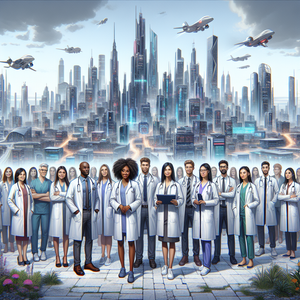
Navigating 15 Unique Career Paths for Biomedical Science Graduates: A Comprehensive Guide
A degree in biomedical science paves the way for a multitude of career opportunities spanning various sectors, such as healthcare, pharmaceuticals, environmental science, and forensic investigation. This dynamic discipline equips graduates with vital skills in research methodologies, laboratory techniques, and analytical reasoning, positioning them as impactful contributors to society and scientific advancement. While many choose to follow conventional routes in clinical or research settings, others embark on innovative careers in biopharmaceutical sales and health policy, highlighting the versatility of a biomedical science education. In this article, we explore 15 unique career paths available to biomedical science graduates, detailing job responsibilities, necessary qualifications, potential salary ranges, career progression, and current industry trends.
Job Summaries:
Biomedical Scientist:
- Biomedical scientists play a crucial role in diagnosing diseases through the analysis of biological specimens.
- Working in laboratory environments, they utilize cutting-edge equipment to conduct tests on blood, tissues, and other samples.
- A strong foundation in microbiology, biochemistry, and analytical techniques is essential.
- Typically, candidates hold a degree in biomedical science or a related field, paired with relevant laboratory experience.
- Their work significantly impacts patient care, providing timely and accurate results that shape treatment decisions.
- With the healthcare sector expanding, opportunities in hospitals and diagnostic labs are on the rise.
Clinical Research Associate (CRA):
- CRAs are responsible for overseeing clinical trials, ensuring they adhere to regulatory standards.
- Their duties encompass designing study protocols, recruiting participants, collecting data, and analyzing results.
- A bachelor’s degree in biomedical science or life sciences is generally required, along with strong communication and organizational skills.
- As the demand for new therapies grows, CRAs become vital to the development of safe and effective treatments, with numerous roles available in pharmaceutical companies and research institutions.
Forensic Scientist:
- Forensic scientists leverage their knowledge of biology and chemistry to analyze evidence from crime scenes.
- They perform tests, interpret findings, and may even testify in court.
- While a biomedical science degree provides a solid foundation, specialized training in forensic science is often necessary.
- This role is critical for the criminal justice system, offering opportunities in forensic laboratories for those intrigued by the intersection of science and law.
Microbiologist:
- Microbiologists study microorganisms, including bacteria, viruses, and fungi, to understand their effects on humans, animals, and ecosystems.
- They carry out experiments and analyze data in settings ranging from research institutions to hospitals and pharmaceutical companies.
- A degree in biomedical science or microbiology is essential, accompanied by strong analytical skills.
- Microbiologists contribute to public health by developing treatments for infections and investigating disease mechanisms.
- The increasing focus on infectious disease research opens doors to diverse job opportunities.
Medical Laboratory Technician:
- Medical laboratory technicians conduct routine tests that aid in disease diagnosis.
- They prepare specimens, operate laboratory equipment, and maintain precise records.
- Generally, a bachelor’s degree in biomedical science or a related field is required, with certification being advantageous.
- Technicians are vital in healthcare, ensuring accurate test results guide patient treatment.
- Numerous roles exist in hospitals and diagnostic laboratories for those drawn to this hands-on career.
Pharmaceutical Sales Representative:
- Graduates with a biomedical science background thrive in pharmaceutical sales by applying their scientific knowledge to market medications to healthcare professionals.
- Responsibilities include building relationships, delivering presentations, and sharing detailed product information.
- Strong communication skills are crucial in this role, which significantly influences patient access to medications.
- Many sales positions are available across the pharmaceutical industry for interested candidates.
Toxicologist:
- Toxicologists examine the effects of chemicals on living organisms.
- They conduct tests to assess toxicity levels.
- They help to create safety regulations for drugs, foods, and environmental pollutants.
- A biomedical science degree is typically required, supplemented by specialized training in toxicology.
- This role is essential for public safety and environmental health.
- There are opportunities in regulatory agencies and research institutions.
Research Scientist (Life Sciences):
- Research scientists conduct experiments and studies to enhance knowledge in biology, biochemistry, and genetics.
- They design research methodologies, analyze data, and publish their findings in scientific journals.
- Advanced research positions often prefer candidates with doctoral degrees.
- A bachelor’s or master’s degree in biomedical science can lead to entry-level roles.
- These scientists contribute to scientific advancements that may improve healthcare outcomes.
- Opportunities are available in academia and industry.
Dietitian/Nutritionist:
- Dietitians and nutritionists apply food and nutrition principles to promote health and manage diseases.
- They assess clients' dietary needs, develop meal plans, and educate on nutrition.
- Typically, a degree in biomedical science, along with a dietetics-related program and licensure, is required.
- This role is essential for public health, as dietitians help individuals adopt healthier lifestyles.
- Job openings in healthcare settings, wellness programs, and private practices are plentiful for those considering this career.
Environmental Scientist:
- Environmental scientists investigate ecological challenges and develop solutions.
- They conduct research, analyze data, and work on projects related to pollution control and resource management.
- A degree in biomedical science, especially with a focus on environmental studies, is beneficial for this role.
- Environmental scientists contribute to ecosystem protection and public health, with opportunities in government agencies and environmental organizations.
Public Health Analyst:
- Public health analysts evaluate health trends and formulate strategies for improving community health.
- They analyze data, prepare reports, and collaborate with healthcare providers and policymakers.
- A biomedical science background is valuable for understanding health data and epidemiology.
- This role is increasingly vital as public health concerns grow, leading to job opportunities in governmental health departments and non-profits.
Health Policy Advisor:
- Professionals with a biomedical science background can pursue careers in health policy.
- They analyze and influence health regulations and legislation.
- Strong analytical and communication skills are essential in this role.
- Knowledge of the healthcare system is essential in this role.
- It allows individuals to shape healthcare access and quality on a broader scale.
- Positions are available in government and advocacy organizations.
Bioinformatics Specialist:
- Bioinformatics specialists utilize computational techniques to analyze biological data, particularly in genomics and proteomics.
- A solid foundation in both biology and computer science is necessary.
- This burgeoning field is critical for advancing personalized medicine and drug development.
- Opportunities exist in research institutions and biotech companies.
Clinical Data Manager:
- Clinical data managers focus on collecting and managing data from clinical trials.
- Ensuring data integrity and compliance with regulatory standards.
- A biomedical science degree is typically required.
- Experience in data management or statistics is typically required.
- This role is essential for the successful execution of clinical trials.
- There is increasing demand for this role as the pharmaceutical industry expands.
Regulatory Affairs Specialist:
- Regulatory affairs specialists ensure that drugs and medical devices comply with regulations and standards.
- They play a key role in the approval process for new products.
- A biomedical science degree along with knowledge of regulatory processes is advantageous for this career.
- Opportunities exist within pharmaceutical and biotechnology companies, as well as consulting firms.
The diverse career paths available to biomedical science graduates showcase the extensive applications of this education. Each role highlights unique contributions to society and science, allowing graduates to find their place in an ever-evolving field. For those interested in exploring these opportunities further, it’s recommended to check job boards and career resources to stay informed about industry trends and job openings that align with personal interests and skill sets.
Explore More Jobs

